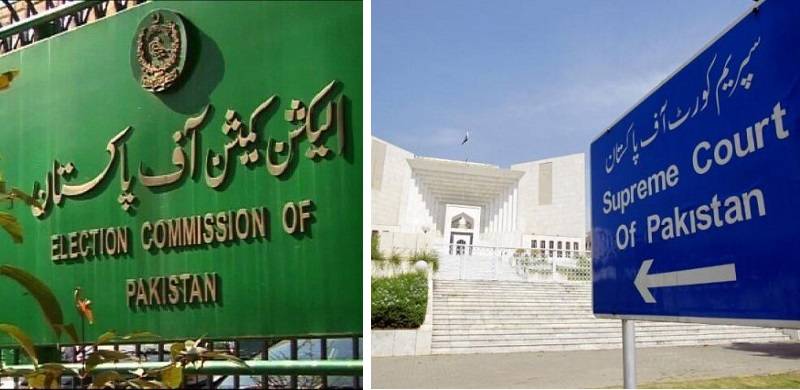The Election Commission of Pakistan (ECP) has filed a review petition in the Supreme Court regarding the decision on reserved seats, requesting that the Supreme Court withdraw its decision of July 12 regarding the reserved seats.
It is worth recalling that on July 12, a 13-member full court bench of the Supreme Court, headed by Chief Justice of Pakistan Qazi Faez Isa, delivered a reserved judgment on the petition concerning the reserved seats of the Sunni Ittehad Council.
Eight judges of the full court bench of the Supreme Court ruled in favor of Pakistan Tehreek-e-Insaf (PTI), stating that PTI is entitled to the reserved seats.
The Supreme Court, in its decision, nullified the decisions of the Election Commission and the Peshawar High Court, ordering that the reserved seats be given to PTI.
Last week, the two senior-most judges of the Supreme Court, Justice Aminuddin Khan and Justice Naeem Akhtar Afghan, issued a detailed dissenting note on the majority decision of the Supreme Court concerning the Sunni Ittehad Council’s case on the allotment of reserved seats.
In their detailed dissenting note, Justice Aminuddin Khan and Justice Naeem Akhtar Afghan stated that to provide relief to PTI, Articles 51, 63, and 106 of the Constitution would have to be suspended.
On July 15, Pakistan Muslim League (N) filed a review petition in the Supreme Court against the decision on reserved seats, followed by the Pakistan Peoples Party challenging the decision in the Supreme Court on July 23.
Now, the Election Commission has decided to file a review petition in the Supreme Court regarding the decision on reserved seats.
Sources indicated that the Election Commission has directed its legal team to prepare the review appeal, and the commission will file the petition in the Supreme Court today.
Sources stated that the Election Commission, being a constitutional body, will defend its powers in the Supreme Court and will object to the 15-day period given to independent members.
According to commission sources, the Constitution grants independent candidates 3 days, whereas the Supreme Court provided 15 days in its decision. They questioned how candidates who did not submit party tickets to the returning officers could be considered PTI candidates. Merely writing PTI in the nomination papers does not make one a party candidate; this ambiguity will also be part of the appeal.
Sources said that the Election Commission had already approached the Supreme Court to clear the ambiguity regarding PTI’s signature authority, but the Supreme Court has not yet responded to the commission’s query. The Election Commission has also started scrutinizing the affidavits and party affiliation forms of independent members, with a four-member committee headed by the special secretary conducting the scrutiny.
PTI Got Relief They Didn’t Even Ask For, Rana Sanaullah’s Reaction to the Supreme Court Decision
According to sources, the committee will review the nomination papers and affidavits of independent members and, if necessary, summon the independent members to verify the affidavits.
Background of the case:
On May 6, the Supreme Court suspended the March 14 decision of the Peshawar High Court and the March 1 decision of the Election Commission of Pakistan to deprive the Sunni Ittehad Council of reserved seats for women and minorities, referring the matter to a larger bench.
On May 3, the Supreme Court scheduled the case concerning PTI not getting reserved seats for a hearing.
On March 4, the Election Commission of Pakistan rejected the Sunni Ittehad Council’s requests for the allocation of reserved seats.
A five-member commission, headed by Chief Election Commissioner Sikandar Sultan Raja, reserved the decision on February 28 after hearing the petitions.
The Election Commission of Pakistan, in a 22-page decision issued by a four-to-one majority under Article 53(6) of the Constitution and Section 104 of the Election Act, rejected the Sunni Ittehad Council’s request to allocate reserved seats, stating that the Sunni Ittehad Council was not entitled to reserved seats due to violation of the law and failure to provide the party list initially.
The decision stated that these reserved seats would not remain vacant and would be distributed among political parties through proportional representation.
The Election Commission decided to allocate all vacant reserved seats to other parties, approving the requests of Pakistan Muslim League (N), Pakistan Peoples Party, Muttahida Qaumi Movement Pakistan (MQM-P), and Jamiat Ulema-e-Islam Fazl (JUI-F).
The Chief Election Commissioner and members from Sindh, Khyber Pakhtunkhwa, and Balochistan supported the majority decision, while Punjab member Babar Bharoana dissented from the majority decision.
Subsequently, on March 4, PTI declared the Election Commission of Pakistan’s decision not to allocate reserved seats as ‘unconstitutional’ and announced that it would challenge the decision in the Supreme Court.

